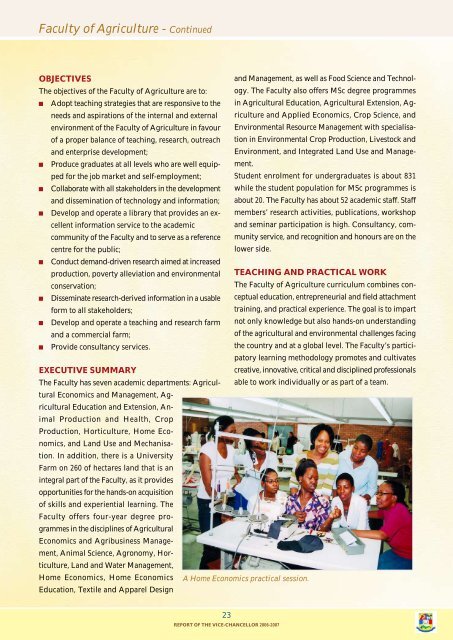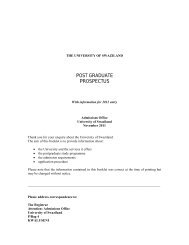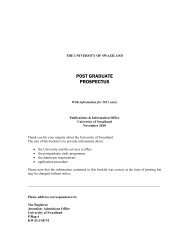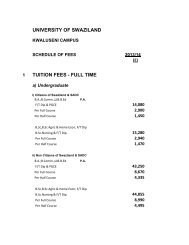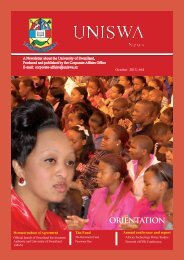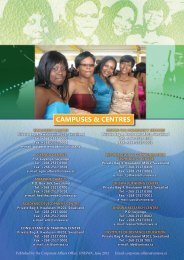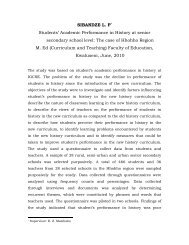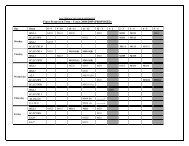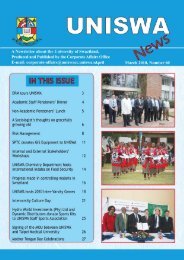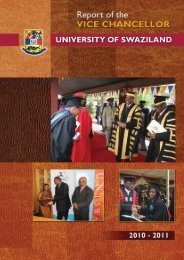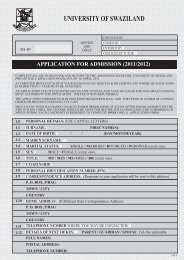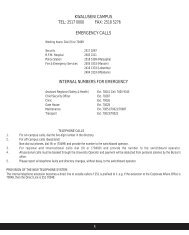2006/2007 - University of Swaziland
2006/2007 - University of Swaziland
2006/2007 - University of Swaziland
Create successful ePaper yourself
Turn your PDF publications into a flip-book with our unique Google optimized e-Paper software.
Faculty <strong>of</strong> Agriculture - ContinuedOBJECTIVESand Management, as well as Food Science and Technology.The Faculty also <strong>of</strong>fers MSc degree programmesThe objectives <strong>of</strong> the Faculty <strong>of</strong> Agriculture are to:Adopt teaching strategies that are responsive to the in Agricultural Education, Agricultural Extension, Agricultureand Applied Economics, Crop Science, andneeds and aspirations <strong>of</strong> the internal and externalenvironment <strong>of</strong> the Faculty <strong>of</strong> Agriculture in favour Environmental Resource Management with specialisationin Environmental Crop Production, Livestock and<strong>of</strong> a proper balance <strong>of</strong> teaching, research, outreachand enterprise development;Environment, and Integrated Land Use and Management.Produce graduates at all levels who are well equippedfor the job market and self-employment; Student enrolment for undergraduates is about 831Collaborate with all stakeholders in the development while the student population for MSc programmes isand dissemination <strong>of</strong> technology and information; about 20. The Faculty has about 52 academic staff. StaffDevelop and operate a library that provides an excellentinformation service to the academicand seminar participation is high. Consultancy, com-members’ research activities, publications, workshopcommunity <strong>of</strong> the Faculty and to serve as a reference munity service, and recognition and honours are on thecentre for the public;lower side.Conduct demand-driven research aimed at increasedproduction, poverty alleviation and environmental TEACHING AND PRACTICAL WORKconservation;The Faculty <strong>of</strong> Agriculture curriculum combines conceptualeducation, entrepreneurial and field attachmentDisseminate research-derived information in a usableform to all stakeholders;training, and practical experience. The goal is to impartDevelop and operate a teaching and research farm not only knowledge but also hands-on understandingand a commercial farm;<strong>of</strong> the agricultural and environmental challenges facingProvide consultancy services.the country and at a global level. The Faculty’s participatorylearning methodology promotes and cultivatesEXECUTIVE SUMMARYcreative, innovative, critical and disciplined pr<strong>of</strong>essionalsThe Faculty has seven academic departments: AgriculturalEconomics and Management, Ag-able to work individually or as part <strong>of</strong> a team.ricultural Education and Extension, AnimalProduction and Health, CropProduction, Horticulture, Home Economics,and Land Use and Mechanisation.In addition, there is a <strong>University</strong>Farm on 260 <strong>of</strong> hectares land that is anintegral part <strong>of</strong> the Faculty, as it providesopportunities for the hands-on acquisition<strong>of</strong> skills and experiential learning. TheFaculty <strong>of</strong>fers four-year degree programmesin the disciplines <strong>of</strong> AgriculturalEconomics and Agribusiness Management,Animal Science, Agronomy, Horticulture,Land and Water Management,Home Economics, Home Economics A Home Economics practical session.Education, Textile and Apparel Design23REPORT OF THE VICE-CHANCELLOR <strong>2006</strong>-<strong>2007</strong>


